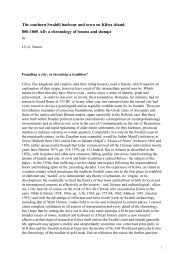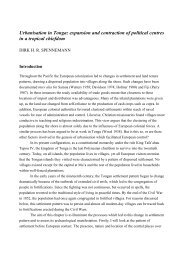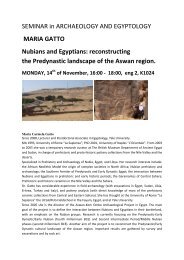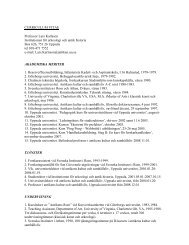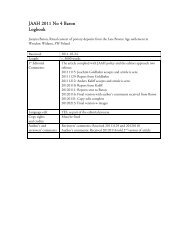Beowulf - Institutionen för arkeologi och antik historia
Beowulf - Institutionen för arkeologi och antik historia
Beowulf - Institutionen för arkeologi och antik historia
You also want an ePaper? Increase the reach of your titles
YUMPU automatically turns print PDFs into web optimized ePapers that Google loves.
Distant or stand-offish Germanic kings are nothing new. Hroðgar’s behaviour towards<br />
<strong>Beowulf</strong> between the fights with Grendel and Grendel’s mother (vv. 1345 ff.),<br />
or Hygelac’s attitude to the young <strong>Beowulf</strong> (vv. 2177 ff.; above p. 89) are significant<br />
examples.<br />
If our interpretation of the poems to Sigibert and Brunhild is correct we can say<br />
that the way the King is depicted in relation to his most loyal men is a projection of<br />
his divine origin. His roots give him the ability to sit in his high settle, survey the world<br />
and know what must be done. They also invest him with the power to make others,<br />
i.e., Gogo and Lupus, feel obliged to carry out his wishes, i.e., do what must be<br />
done. Thus, the King not only towers high above everybody else, he is also alien—<br />
a perfect man but marked by otherness.<br />
Lupus is the hero of the poem and his tour a <strong>Beowulf</strong>ian one inasmuch as it starts<br />
with his being made aware of a threat to the kingdom, and thus the hall; accordingly<br />
he sets out to solve the problem, solves it and returns a hero to the hall. This means<br />
that he has completed a turn in the spiral (cf. Fig. 32), and his actions are like those<br />
of <strong>Beowulf</strong> inspired by loyalty to a king and to the hall-governed society. It is true<br />
that he benefits from his campaign, but for all we know he did not undertake it for his<br />
own benefit. Even the way Lupus handles the emissaries on behalf of the King has its<br />
parallel in <strong>Beowulf</strong>, namely in the negotiations conducted by <strong>Beowulf</strong> and his men<br />
with the courtier Wulfgar, the equivalent of Lupus, who had been sent out to negotiate<br />
on Hroðgar’s behalf.<br />
The hall-governed society is represented by the dukes, whose task it is to approve<br />
of Lupus’ actions, but also by the personification of the hall when we close in<br />
on it:<br />
65 occurrens dominis veneranda palatia comples<br />
et tecnm ingrediens multiplicatur honor.<br />
te veniente novo domus emicat alma sereno<br />
et reparant genium regia tecta suum.<br />
nempe oculos recipit cum te videt aula redire,<br />
(Venantius Book VII, poem 7, ll. 65–69)<br />
When you meet with your lords you fill the venerable palace, and honour, which<br />
enters with you, is multiplied. When you arrive the house shines from a new<br />
serenity and the royal dwelling regains its genius. The hall gets its eyes back<br />
seeing that you return,<br />
These lines hint at the existence of a hall society strongly dependent on information<br />
and therefore also potentially interested in Lupus’ returning with the victory and<br />
knowledge about what happened. The loyal and approving dukes are not a new<br />
acquaintance; on the contrary, we saw them at the wedding when they trotted up the<br />
hill with Sigibert, a happy rejoicing aristocracy otherwise difficult to detect among<br />
the Merovingians.<br />
108



